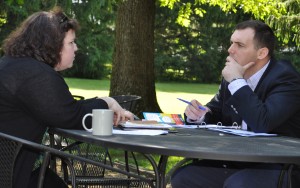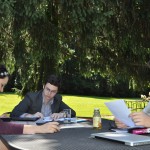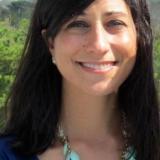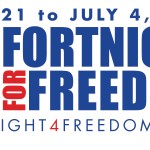Mark O’Neill served in Afghanistan in the U.S. Army and continues his service as a Catholic Voice, helping to make the case for the Church in the public square.
What does the Fortnight mean to you?
The Fortnight is an opportunity to pause and reflect on our heritage of religious freedom here in the United States. I see it as a period of prayer and public action that emphasizes “our first, most cherished liberty.” A liberty guaranteed by the First Amendment to the U.S. Constitution.
What are you doing to make these days different?
It’s important to reflect on how religious liberty has shaped history. In addition to spending time with the Lord during Mass and Benediction, I’m devoting part of each day to learning more about the lives of men and women who died in defense of their faith. Martyrs like Saint Thomas Moore and Saint John the Baptist.
What about religious liberty and protecting it resonates with you?
As a member of the Armed Services, I have devoted my life to the protection of freedoms outlined in the U.S. Constitution. Religious liberty is clearly one of those freedoms. I have been to countries that recognize only one religion, and prohibit the free exercise of others. I can say from firsthand experience that American exceptionalism is inextricably linked to the value it places on religious liberty. Don’t just take my word for it though. Famous historians such as Alexis de Tocqueville have noted the same thing.
What do you wish everyone would appreciate about this moment in our history?
For over 200 years the United States has been a beacon of religious freedom. Religious freedom is why so many came here in the first place. My sincere wish is that everyone understands the Catholic Church is simply asking the current administration not to take the unprecedented step of forcing people of faith to violate their deeply held religious beliefs.
Is there a war on women?
If there is, it’s not being waged by the Catholic Church. The Church agrees that everyone should have access to affordable health care. Catholic bishops have been some of the most ardent supporters of universal health care. This is not an issue about a woman’s access to contraception, which is ubiquitous and inexpensive. The real issue here is one of religious liberty, and whether or not people of faith should be forced to violate their consciences.
What’s your reaction to what the bishops have been saying and doing?
It makes me so proud to be a Catholic. As “shepherds of souls,” the bishops are responsible for the spiritual safety of their flock. They have an obligation to correct those who are in error, especially when it relates to matters of objective truth.
What made you step up to be a Catholic Voice?
I’ve felt for some time now that the Catholic laity has been underrepresented in public debate about the issues which are determining the future of our society. The HHS mandate was a perfect example. Momentum in the debate was on the side of the bishops until the administration’s so-called “accommodation.” During the period of time between the “accommodation” and the bishop’s response, radio and television were dominated by folks supporting the administration’s position. As a result, the momentum seemed to shift — despite polls that suggest that people believe the administration’s position is an unreasonable one. A well-informed, well-catechized laity could have stepped in to fill that void — to give voice to the view that the Catholic Health Association, a key ally of the president, has come around to. I stepped up to be a Catholic Voice because I’m determined not to let that happen again.
What do you wish everyone could know about your Church and why?
I would like everyone to know that my Church is so much more than the one depicted in much of the rhetoric surrounding the HHS mandate debate. The Catholic Church is more than just a place for people of the same faith to gather on Sundays. In addition to being “a gathered assembly of believers in Jesus,” my Church is defined by the corporal works of love and mercy that it performs around the world. It is defined by the Catholic schools, hospitals, and charities that are essential to the well-being of our society.
I wish everyone could know this about my Church, because it will be forced to reduce or eliminate services to some of those who are most in need when crippling fines are levied against it for refusing to violate its beliefs.













